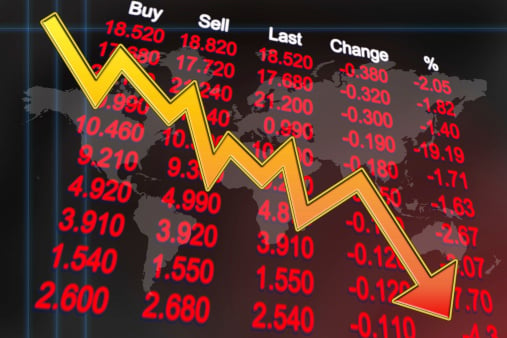With the CBOE Market Volatility Indicator, or VIX, trading at multiyear lows for almost two years, many have warned of complacency by investors. The VIX is a key measure of market expectations of near-term volatility conveyed by S&P 500 stock index option prices. The higher the volatility goes, the more market concerns are mounting, and after a 16% move in the past two days, something may be ready to give. Source: Thinkstock
Source: Thinkstock
A new report from the analysts at Jefferies points out that while few sectors are positively correlated to higher volatility, utilities being one, many are negatively correlated. In other words, if volatility goes up, these sectors and stocks can get hit hard. The Jefferies team took a look at their coverage universe and the S&P 500, and they found that the 18 stocks with the most negative correlation are all industrials, financials and materials.
Here are the five stocks that will fare the worst in a rising volatility environment and an ensuing market sell-off. Readers may want to check their portfolios for these stocks.
Parker-Hannifin Corp. (NYSE: PH) has the dubious honor of having the highest negative correlation with the VIX of the stocks studied by Jefferies. The stock printed a double top high in June, then rolled over and has not recovered. The company missed fourth-quarter earnings estimates by a penny, and generating 30% of revenue from a Europe that seems very economically weak may not be good. Investors are paid a 1.7% dividend. The Thomson/First Call consensus price target is $127.20. Shares closed trading on Tuesday at $113.69.
ALSO READ: Top IPO Stocks From This Year to Be Added to the Russell 2000
Cummins Inc. (NYSE: CMI) is another large cap industrial and it came in a close second in the negative correlation rankings. The company has multiple business units that design, manufacture, distribute and service diesel and natural gas engines and related technologies, including fuel systems, controls, air handling, filtration, emission solutions and electrical power generation systems. Investors are paid a 2.2% dividend. The consensus price target for the stock is $166.41. Shares closed the trading session on Tuesday at $134.59.
Franklin Resources Inc. (NYSE: BEN) comes in third with a very negative correlation to the VIX. The company is a mutual fund powerhouse and continues to grow its huge asset base. With the well-known Franklin and Franklin Templeton mutual funds still taking in a resurgent, but still struggling level of retail investments, a protracted dive in the equity markets is never good for big asset managing financials. When panic shows up, so do redemptions. Investors are paid a 0.9% dividend. The consensus price target is $60.47. The stock closed at $54.69.
T. Rowe Price Group Inc. (NASDAQ: TROW) is another top money management firm, with a host of successful mutual fund offerings, and comes in number four on the Jefferies list. While like Franklin Resource, the company has a very good product base, and is widely used in corporate 401-K plans, a big market sell-off can mean big redemptions, hence the elevated negative correlation. Investors are paid a solid 2.3% dividend. The consensus price target is $90.24. Shares closed trading on Tuesday at $79.04.
Hartford Financial Services Group Inc. (NYSE: HIG) is yet another top financial name that hits the list with a negative correlation. The company provides insurance and financial services to individual and business customers, primarily in the United States and Japan. From the broken record department: they would face the same issues as other top financials do. Investors are paid a 2.1% dividend. The consensus price target is $41. The stock closed Tuesday at $37.07.
ALSO READ: 5 Top Tech Stocks Ready to Benefit From the Apple Watch
All the stocks listed by Jefferies are outstanding companies, and by no means should be considered overly risky. They are however stocks that will get hit hard in a big volatility swing and market downturn. If investors have big gains in these stocks, consider taking some gains if long, or hedging with options.
Take This Retirement Quiz To Get Matched With A Financial Advisor (Sponsored)
Take the quiz below to get matched with a financial advisor today.
Each advisor has been vetted by SmartAsset and is held to a fiduciary standard to act in your best interests.
Here’s how it works:
1. Answer SmartAsset advisor match quiz
2. Review your pre-screened matches at your leisure. Check out the
advisors’ profiles.
3. Speak with advisors at no cost to you. Have an introductory call on the phone or introduction in person and choose whom to work with in the future
Take the retirement quiz right here.
Thank you for reading! Have some feedback for us?
Contact the 24/7 Wall St. editorial team.



